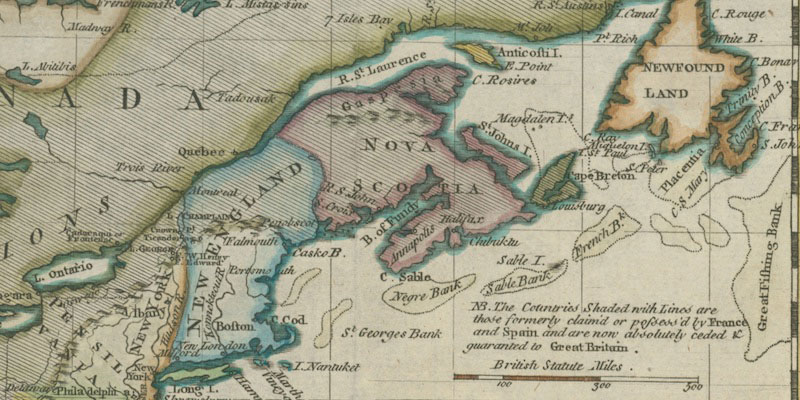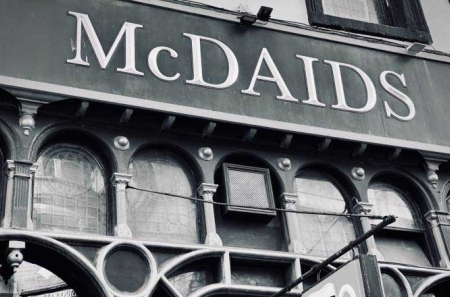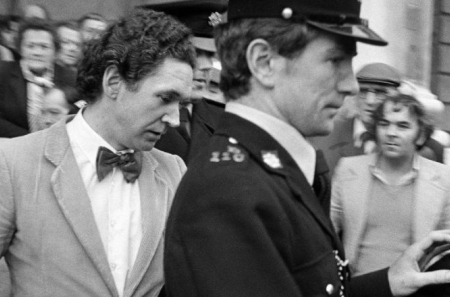
The tercentenary of the 1718 migration from Ulster – the Craighead family
28 June 2018The 1718 emigration is one of the earliest known planned group migrations from Ireland. Migrants from the Bann valley founded towns in New England.
Hundreds of people from the North of Ireland travelled to America, often in groups together. Some of the leaders are featured in the DIB. Read the entry on the three generations of the Craighead family, by Dr Linde Lunney, below.
Craghead (Craighead), Robert, senior (1633–1711), presbyterian minister, was born in Scotland, probably in the east of the country, and graduated MA (1653) from St Andrews university. He was licensed as a commonwealth minister in the parish church of Donoughmore, Co. Donegal, and received the tithes of the parish in December 1658; in 1661 he was deposed for nonconformity, but continued to minister there for many years as a minister of the Laggan presbytery. In 1689 he moved to Derry city, where he was to become minister of First Derry; however, on the second day of the siege of the city (April 1689) he and some of his family fled to Scotland. They were robbed en route of all their possessions by Jacobite soldiers. He was allocated a church in Glasgow, but he returned to Derry when the siege ended, and was installed in First Derry on 1 July 1690, the same day as the battle between the two kings, James II (qv) and William III (qv), at the River Boyne. In reply to several attacks on presbyterians by William King (qv), bishop of Derry, Craghead published pamphlets in the 1690s in which he forcefully upheld presbyterian forms of worship. The bishop had, according to Craghead, depicted presbyterians ‘as black as heathens . . . degenerate and barbarous’, and in defiance of the bishop's views on civic government, the minister expressly defended the mayor and burgesses of the city, mostly dissenters, who were generally unwilling to take communion in the established church as demanded by the act of uniformity. Like most inter-sect arguments of the period, the controversy, though couched in theological terms, had political implications. Craghead was asked by Synod to prepare materials on the history of the church; nothing is known of any outcome. His Advice to communicants (1698) was so well regarded that it was reprinted in Glasgow (1714, 1758) and in Philadelphia (1792, 1838). Craghead spent a short time in Glasgow (1698–9) as minister of Blackfriars church, but returned to Derry, and died there 27 August 1711.
His wife was Agnes, daughter of the Rev. John Hart of Taughboyne, another minister who was ejected for nonconformity, and who was one of four ministers who had suffered an imprisonment of six years because he had refused to obey a summons to attend the bishop's court. Robert and Agnes Craghead had at least four children: Katherine, who married the Rev. William Homes (qv), and emigrated with him to New England, and three sons.
One son was Robert Craighead junior (1684–1738), born probably in Donoughmore, who received an excellent education, first in philosophy and then in divinity, at the universities of Glasgow, Edinburgh, and Leiden; he graduated MA from Leiden in 1702. He was licensed by Derry presbytery, and ordained as minister of Capel St. congregation (later known as Abbey) in Dublin on 11 October 1709. He was elected moderator of general synod in 1719, and was thus the outgoing moderator in 1720 – the year in which the subscription controversy, which was to become one of the most important and divisive issues in the history of presbyterianism, was first brought before the synod in Ireland. Though his own beliefs were orthodox trinitarian, Craighead' s sermon on the occasion, afterwards printed as A plea for peace . . . , recommended toleration of those who reserved the right not to subscribe to human formulations of doctrine, in the interests of promoting church harmony, and the synod subsequently passed the ‘Pacific act’ in 1720. Neither this act, nor many further discussions of the matter over many years, succeeded in producing the harmony sought by Craighead. In 1728 Craighead, with two other Dublin ministers, Francis Iredell and Richard Choppin, prepared an address to the king, in which they noted that great numbers of presbyterians had gone to find in America ‘that liberty and ease . . . denied in their native country’. They sought the assistance of the London government in mitigating the conditions under which dissenters lived, and particularly cited the obnoxious sacramental test. In the spring of 1729 Iredell and Craighead were asked by the lords justices of Ireland to prepare a report on the matter; they consulted all the northern presbyteries, and presented a fuller analysis of the causes of emigration, including economic as well as religio-political motivation. Craighead visited London in 1729 and 1731 in connection with the presentation of the memorial to government, and with support from Primate Boulter (qv) successfully lobbied for payment of arrears of regium donum, the king's bounty first paid to presbyterian ministers in 1672. The civil and political liberties sought by his co-religionists were, however, still denied by the Dublin government. Craighead died in Dublin 30 July 1738 after a lingering illness; there is no record of any marriage or family, but his congregation and friends mourned his loss.
Another son of Robert and Agnes Craghead was Thomas Craghead (d. 1739), born in Donoughmore, possibly around 1670, though one source says about 1664. He is said to have married (1690) Margaret Laird in Scotland, and he graduated MA from Edinburgh (1691), was licensed by Laggan presbytery, and was ordained in Ballintra and Castlederg (6 July 1698). He resigned Ballintra in 1710, and in 1714, with testimonials from Ulster, emigrated with his family and with his sister Katherine Homes, her husband, and family to New England. The westwards migration of Ulster presbyterians in America, from the New England seaboard to the frontier in Pennsylvania, is reflected in the shifting ministry of Thomas Craghead. In 1715 he was installed as minister of Freetown, Massachusetts. On 22 September 1724 he was installed in White Clay Creek, Delaware. He was almost certainly one of the six ministers who in 1729 formed a committee of synod to draft a report on the need to impose upon ministerial candidates a subscription to the Westminster confession; the ‘adopting act’ of 1729, which was passed as a result, is regarded as one of the most important events in the early history of the American presbyterian church. He resigned after nine years in Delaware; was installed in Pequea, in the presbytery of Donegal, Pennsylvania (31 October 1733); resigned in 1736; and was installed in Hopewell congregation, Pennsylvania (October 1738). In 1736 the session of Pequea complained that the minister had barred his wife Margaret from receiving communion because of ‘a dreadful delusion of Satan, if not a delirium in his head’; the session's complaint was on account of the minister's failure to consult them before debarring her, as required in church law and usage. The presbytery ordered her to be admitted to communion in the congregation again, and Craghead reluctantly did so. He died 26 April 1739, while preaching in the pulpit of Hopewell church. Thomas and Margaret Craighead are said to have had four sons and a daughter Jane, who married the Rev. Adam Boyd (1692–1768), one of the first presbyterian ministers in Pennsylvania, who was from Co. Antrim, and may have been a brother of William Boyd (qv) (d. 1772).
One of their sons, Alexander Craighead (c.1707–1766), born in Ireland, was seven or eight years old when he went to America with his family and his aunt's family, arriving in Boston in October 1715. They lived in Massachusetts, Delaware, and then in Pennsylvania, where he most likely received some of his education from the Rev. William Tennent (qv) (1673–1745). It is certain that he was strongly influenced by the New Light tendency in American presbyterianism of the time, which was associated with many of those trained by William Tennent, including Gilbert Tennent (qv), Samuel Blair, and Samuel Finley (qv). These men advocated a revival of religion on evangelical principles, and particularly stressed the need for a ministry by those who had experienced conversion, rather than those who had, as they claimed, merely theoretical knowledge of divine grace. Craighead passed without distinction the necessary presbytery examinations before being licensed by the presbytery of Donegal on 8 October 1734. He was installed in Middle Octorara (Octoraro) in Lancaster county, Pennsylvania (18 November 1735); he was the first presbyterian minister west of the Susquehanna river. In the 1740s he was deeply involved in the Great Awakening in the American churches, a revival of religion which grew in part from the exhortatory evangelism of such itinerants as the Englishman George Whitefield. Craighead accompanied Whitefield on some of his preaching tours in Chester county, Pennsylvania, in November 1739; it is said that the woods rang with the praise hymns they sang as they rode. The schism between the Old Side and the New Side widened rapidly at this time; the Old Side, often though not always older ministers, did not particularly relish this revival, and resented the intrusion into their congregations of the enthusiasm and charismatic preaching of ministers from other congregations and even other presbyteries, who frequently addressed unprecedentedly large congregations out of doors. In 1740 Craighead intruded into the congregations of Francis Alison (qv) and John Thomson, and charges were brought against him and another minister at the meeting of Donegal presbytery in Middle Octorara in September 1740. Angry crowds ‘railing at the members in the most scurrilous and opprobrious terms’ prevented his trial by presbytery from taking place until the meeting adjourned to a private house; the two ministers admitted intruding, but refused to desist; the presbytery minutes state that ‘we have not known a parallel instance [of defiance] since we have been capable to mark any thing in the world.’ Craighead was suspended, but refused to accept the verdict because he had been tried by the same body that had accused him. He continued to preach and to minister; in 1743 he administered the Scottish covenant to his congregation in Octorara. He then urged Synod to call for a renewal of the covenant as an antidote to contemporary falling away of religion; in 1743 the synod accused him of censoriousness and rejected his efforts to reintroduce covenanting zeal. He described the events in Octorara in a publication, Renewal of the covenants national and solemn league . . . (1748). Benjamin Franklin was the printer, and also printed Craighead's The reasons for . . . receding from the present judiciaries of the church (1743). Craighead is thus closely linked with the concept of a covenanted polity and with the reluctance to pay allegiance to non-covenanted leaders which had characterised the Scottish covenanters, and which some scholars trace in the intellectual climate that produced the American declaration of independence (1776).
The New Side emphasised the importance of outreach to the frontier communities, and Alexander Craighead moved with hundreds of other Scotch-Irish settlers down the Shenandoah valley. Perhaps by 1749, and certainly by March 1753, he was living on a large tract of land by the Cowpasture river in Virginia, and was minister of Windy Cove, where the congregation was under constant threat of Indian attack, and went armed to church. He moved in January 1758 to Mecklenburg county, North Carolina, and was the first pastor from November 1758 of Sugar Creek and Rocky River churches, in an area settled largely by the ‘Scotch-Irish’, which developed later into the city of Charlotte. Partisan authors claim to detect Craighead's influence on the radical ‘Mecklenburg resolves’ of May 1775; but since Craighead himself had died 12 March 1766, it is only the known presence at the drafting convention of numerous presbyterians who had been Craighead's hearers that can be adduced as evidence for any effects of his covenanting theology on the advanced political thought in the region. A putative document of the same date, known as the ‘Mecklenburg declaration of independence’, which is said to have pre-dated and perhaps influenced the much more famous Jeffersonian document, may also have incorporated Craighead's views, but since no contemporary copy is extant, this is even less capable of proof.
The minister seems to have married first (c.1734) Agnes Brown, in Pennsylvania; she may have died after the birth of her second daughter. He married secondly a Miss Scott; they had four or five daughters and two sons. Shortly before his death (perhaps in 1764 or 1765), he married Jean Martin, who may have been daughter of a minister. They seem not to have had any children.
American descendants of Robert and Agnes Craghead are numerous, and include many people prominent in later American presbyterianism. Another grandson of Thomas and Margaret Craighead was the Rev. John Craighead (1742–99), a minister in Pennsylvania who raised a company of soldiers within his congregation to fight in the American war of independence; as chaplain, he is said to have ‘preached and fought alternately’ (Craighead, 336). One of Alexander's sons was founding principal of Davidson Academy, Tennessee, later to become Nashville University, and founding minister of the first presbyterian church in Nashville; the other son was one of the first settlers in the city of Knoxville, Tennessee. Robert's grandson, George Craighead, was said to have been an intimate friend of George Washington.
Robert Craghead, The true terms of Christian and ministerial communion . . ., containing a short account of the author by Mr Abernethy (1739); James S. Reid, History of the Presbyterian Church in Ireland, ii (1867), 425–33; James Geddes Craighead, The Craighead family: a genealogical memoir of the descendants of Rev. Thomas and Margaret Craighead 1658–1876 (1876); J. G. Craighead, Scotch and Irish seeds in American soil (1878), 298; C. Huston Irwin, History of presbyterianism in Dublin and the south and west of Ireland (1890), 55, 62–4, 266; Alexander G. Lecky, The Laggan and its presbyterianism (1905), 21; Archibald Henderson, ‘The Mecklenburg declaration of independence’, Journal of American History (1912); Guy S. Klett, Presbyterians in colonial Pennsylvania (1937); James and Samuel McConnell, Fasti of the Irish presbyterian church (1951); Catalog of the Library of Congress; David W. Hall, ‘On the hermeneutics of subscription’, Premise, ii, no. 1 (1995), 8–13; Tommy Lee, ‘Presbyterians and revivalism . . .’ (1997) (at http://www.homes.org/ theologia/papers/tlee_presbyterians_and_revivalism.html); Anon., ‘The Scottish covenanting struggle, Alexander Craighead and the Mecklenburg declaration’ (at http://members.aol.com/Lettermen2/Craig.html); History of Rocky River Presbyterian church (at www.rockyriver.org/history/pastor.html); Peter J. Wallace, ‘Old Light on the New Side: John Thomson and Gilbert Tennent on the Great Awakening’ (at http://www.nd.edu/pwallace/thomson.txt); family information from Phillips Verner Bradford, family historian, at http://www.concentric.net; family information at http://www.riggenbach.org/html (all internet sources accessed Oct. 2000); family information from Ben Grimes, family historian, and from Janine Bentley
Follow the DIB on Twitter @DIB_RIA – where we post topical biographies.
All 10,423 biographies are available at: dib.cambridge.org



